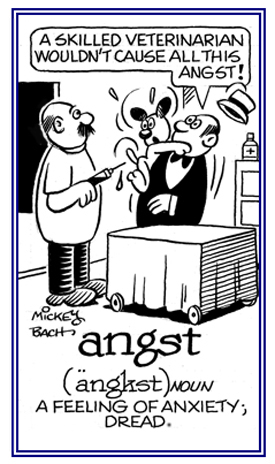anxi-
(Latin: anxius, solicitous, uneasy, troubled in mind)
Jeremy, being just a teenager, had a feeling of angst after he suddenly lost both of his parents in a car accident and didn't know what kind of future he would have.
2. Etymology: from German angst, "neurotic fear, anxiety, guilt, remorse" from Old High German angust, from the root of anger.For many writers, the question of how technology will shape book publishing inevitably leads to the question of how writers will be paid. Currently, publishers have been paying authors an advance against royalties, which are conventionally earned at the rate of 15 percent of the cover price of each copy sold.
The internet makes it a lot easier for writers to spread their content free of charge. Not surprisingly, writers have greeted these measures with a mixture of enthusiasm and dread or angst.

Go to this Word A Day Revisited Index
so you can see more of Mickey Bach's cartoons.
2. Tending to prevent or to relieve anxiety.
2. A cause of anxiety: "For some people, air travel is a real anxiety."
3. In psychiatry, a state of apprehension, uncertainty, and fear resulting from the anticipation of a realistic or fantasized threatening event or situation, often impairing physical and psychological functioning.
4. Eager, often an agitated desire: "My anxiety was to make a good impression."
The following nouns refer to troubled states of the mind: anxiety, worry, care, concern, solicitude
- Anxiety suggests feelings of fear and apprehension.
- Worry implies persistent doubt or fear.
- Concern stresses serious thought combined with emotion.
- Solicitude is active and sometimes excessive concern for another's well-being.
Life is stressful for most people. There are day-to-day problems on top of dealing with work and taking care of the family. Fortunately, most of us can "blow off some steam", finding the time to relax and have fun.
We know that anxiety motivates us to get things done; yet for some people, stress and anxiety make it difficult to function on a daily basis. In these cases, anxiety doesn't help motivate; it interferes.
Chances are good that many people quietly suffer from disruptive anxiety without seeking mental health treatment. Instead, they often complain of physical problems and go to their family doctors, internists, or cardiac specialists for medical treatment.
Often both the doctor and the patient fail to recognize that anxiety is causing these symptoms. The failure to seek mental health treatment is particularly unfortunate, as anxiety disorders are some of the issues most effectively treated by psychosocial interventions.
2. A tranquilizer used to relieve anxiety and reduce tension and irritability; anxiety relieving.
2. Attended with, showing, or causing anxiety: "She spent an anxious night waiting for the test results."
3. Full of mental distress or uneasiness because of fear of danger or misfortune; greatly worried; solicitous: "Her parents were anxious about her poor health."
4. Earnestly desirous; eager (usually followed by an infinitive or for): "They were anxious to please"; "They were anxious for our happiness."
5. Attended with or showing solicitude or uneasiness: "He had anxious forebodings about going on the trip."
Anxious has a long history of use roughly as a synonym for eager, but many prefer that anxious be used only when its subject is worried or uneasy about an anticipated event.
Anxious and eager are somewhat analogous in meaning but careful speakers and writers use anxious when some doubt or worry exists; as, "She is anxious because the plane is long overdue." It is eager when the mood is one of joyous anticipation: "I am eager to hear the awards announced."
2. A relatively permanent state of anxiety occurring in a variety of mental disorders.
Inter-related cross references, directly or indirectly, involving the "mind, mental" word units: anima-; deliri-; hallucina-; menti-; moro-; noo-; nous; phreno-; psych-; thymo-2.
